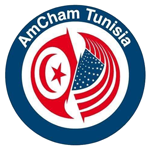The Minister of Finance, H.E. Slim Chaker, spoke passionately today at the AmCham Tunisia luncheon dedicated to “Tunisia’s Major Financial Reforms.” Speaking frankly with the nearly 100 participants, Minister Chaker said that the biggest challenge facing Tunisia is creating jobs to alleviate the country’s serious unemployment, especially among its youth. He outlined several initiatives he is taking to improve the economic climate, and then identified five other challenges facing the country.
The American Chamber of Commerce in Tunisia (AmCham Tunisia) hosted the luncheon for its members, partners and sponsors at the Concorde Hotel in Les Berges du Lac; during which the American Ambassador to Tunisia, H.E. Daniel H. Rubinstein was an honored guest.
Minister Chaker said that while Tunisia has a diversified economy, a good industrial base and a well-educated population, small to medium businesses (SMEs) need help learning about how to enter the American market. Once they overcome what he referred to as the “psychological barrier” and can proceed with confidence, they will know how to do their businesses. However, another difficulty they face is that some of their competitors have tax-free status while Tunisia does not.
He said, his ministry and the Parliament are working on five new laws that will improve the country’s banking system. Among them he named the Central Bank Law which will give banks more freedom and independence from the political system and recapitalize the 3 pubic banks: STB, BT and BH. The Credit Bureau Law will decentralize finance and provide more services to the whole country. Under this new law the Credit Bureau will work by regions to assess risk and help SMEs acquire loans.
To incentivize business in under-developed areas, cities have been rated according to their development needs. Under this initiative, businesses starting projects in category 1 and 2 cities receive significant tax incentives over more developed cities.
On the topic of attracting foreign investment, he said that American investors could use Tunisia as a platform to reach other markets.
The Ministry of Finance has also been cooperating with US-AID to modernize Tunisia’s Customs Branch and reform its tax laws which will make it more attractive to foreign businesses.
As part of a lively question and answer period, Minister Chaker outlined the 5 major challenges facing Tunisia in its transition to democracy:
- Security and the cost of arms and defense – Tunisia has historically spent a large portion of its resources on education, but now in spending millions on arms and security.
- Economic growth.
- Social instability caused by unemployment and mistrust in the government
- Tunisian’s demand for quick fixes for problems that require long-term solutions
- Lack of trust in the economic environment.
Sponsored By:


